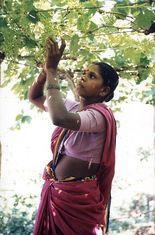
The UK represents a significant market when it comes to Indian grape, taking more than 60 per cent of the country’s exports to Europe.
According to Ashok Motiani, managing director of Indian exporter Freshtrop Fruits, the UK is the country’s most important market and only the best quality Thompson Seedless is sent.
Freshtrop Fruits is one of the leading companies in India and was the first in the corporate sector to enter into exporting fresh fruit to developed countries, says Motiani.
However, he says it was the UK retailers’ need for grapes that opened up the Indian export market: “Indian mangoes were being exported to the UK even in the 1980s, but these were targeted to ethnic consumers and were not a part of the mainstream supermarket fresh produce basket. It was grapes that made all the difference.
“Leading UK supermarkets wanted grapes on their shelves year-round. They were looking out for supplies from the middle of April after the Chilean season, until the end of May. They realised India could fill this gap.”
The Maharashtra Agriculture Marketing Board played an important role in the initial trials on grape exports, he says. “Technology for long-term storage and transportation by sea was imported from the US. It worked, and Indian grapes reached the UK in an acceptable condition, marking the beginning of Indian exports.”
With the grape business taking on a lucrative appearance, there was a scramble to get into the sector, says Motiani: “There was a huge rush into the business, as growers and traders looked for a quick buck.
“However, they did not have sufficient knowledge of the quality and technology required for exports to developed countries, they did not invest, and therefore failed. Only the serious players lasted this initial turbulent period.”
The initial difficulties the industry had to face included the fractured nature of the growing base, with many small land-holdings, which made it difficult to maintain a consistent quality.
Logistics were difficult due to the country’s poor infrastructure, there was too much reliance on weather conditions and reefer availability was poor and costs high.
Motiani says the industry also suffered from a poor image when it came to issues such as hygiene.
While the industry has come a long way since those first few tentative steps, there are still a number of challenges to overcome.
When it comes to breaking the reliance on monsoons to provide water, Motiani says both the industry and the government have made investments in diverting water from nearby rivers into grape growing areas.
A main area of focus for the sector has been pesticide use. “All concerned in the industry,” says Motiani, “are working hard to ensure delivery of fresh Indian grapes to the EU market within the specified MRLs.
“The National Research Centre for Grapes has been assigned the job of looking after an elaborate residue monitoring plan and the 2004 season saw the first results of this.
“A number of laboratories have been financed by the government to upgrade their equipment and laboratory personnel have received training to achieve the desired standards of testing as well.”
When it comes to improving the image of Indian grapes, Motiani says the industry has set up post-harvest facilities and hygiene systems comparable to the best in the world.
“EurepGAP is being implemented at a fast pace and preparations for BRC certifications for packhouses is being made by the major Indian exporters.”
When it comes to competitive advantage, the Indian industry certainly has a few aces up its sleeve.
“We have low labour costs in what is essentially a labour intensive industry,” says Motiani. “Our natural window, from early April to the end of May is also an advantage while our huge domestic market helps to absorb any supply variations we might suffer.”
The diverse spread of the industry’s growing areas is also a useful advantage, allowing supply to continue from another area if weather conditions prove difficult in one.
Freshtrop Fruit itself is also innovating, says Motiani: “We were the first to introduce punnet packaging for grapes in India, and the first to have online systems in place for both forward and backward traceability with due diligence information available on-demand to importers as well as retailers.”
Last season, the company launched a website, www.farm2fork.info, which gives information on all its growers and their chemical use, giving importers secure access to this data.
“This year we are also in the process of undertaking a pilot on establishing a business case for RFID technology for our company,” he adds.
As for the future, Motiani says while things are always uncertain, every stakeholder in India is aggressively addressing the challenges that face them.



